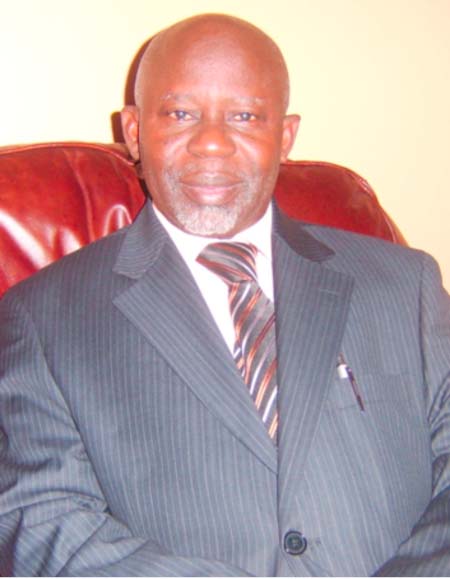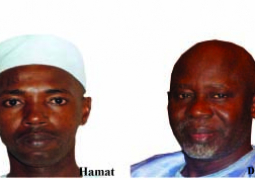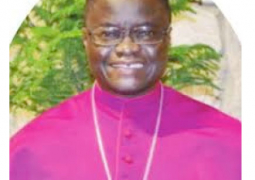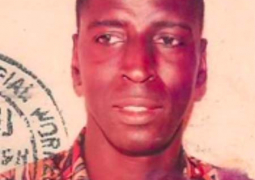
The
case filed by Ousainou Darboe, leader of the United Democratic Party (UDP),
against the Attorney General, the Inspector General of Police (IGP) and the
Director General of the National Intelligence Agency (NIA), was Monday
mentioned at the Supreme Court.
The
plaintiffs are Ousainou Darboe, Kemeseng Jammeh, Femi Peters, Lamin Dibba,
Lamin Jatta, Yaya Bah, Babucarr Camara, Fakebba Colley, Ismaila Ceesay, Momodou
Fatty, Dodou Ceesay, Samba Kinteh, Mamudu Manneh, Nfamara Kuyateh, Fanta
Darboe, Lamin Njie, Juguna Susso, Momodou L.K.Sanneh, Yaya Jammeh and Masanneh
Lalo Jawla.
The
defendants are the Attorney General, the Inspector General of Police (IGP) and
the Director General of the National Intelligence Agency (NIA).
The
plaintiffs are seeking from the Supreme Court a declaration that the
requirement of a license for any public procession under section 5 of the
Public Order Act is illegal and unconstitutional as it violates Section 25(1)
(d) and Section 25(2) of the constitution.
They
are also seeking a declaration that section 5 of the Public Order Act laws of
The Gambia which requires permit or any other authority for the convening or
holding of public procession in any part of The Gambia is illegal,
unconstitutional and made in excess of legislative authority having regard to
Section 25 of the Constitution of The Gambia.
They
also want the court to say that section 5 of the Public Order Act laws of The
Gambia is inconsistent with Sections 25 (1) (d) and sections 25 (2) and void to
the extent of the inconsistency pursuant to Section 4 of the Constitution of
The Gambia.
They
want an order striking out Section 5 of the Public Order Act laws of The Gambia
on the grounds that it is unconstitutional, null, void and was made in excess
of legislative authority.
A
declaration that Section 69 of the Criminal Code is void for lack of certainty
and vagueness, and for its inconsistency with 25(2) of the Constitution.
The
writ to invoke the Supreme Court original jurisdiction disclosed that the
plaintiffs were arrested on 16 April 2016 at Kairaba Avenue and were remanded
in custody, arraigned before the High Court on 20 April, 2016 on seven counts,
two of which were charges framed under Section 5 of the Public Order Act laws
of The Gambia which are counts 5 and 6 and they all pleaded not guilty to the
charges, whilst counts 1 and 2 were framed under Section 69 of the Criminal
Code.
The
writ also disclosed that most of the plaintiffs are members of the United
Democratic Party and were at the time of arrest (safe for a few of them who
were just picked up from the streets by paramilitary) while exercising their
constitutional right to freedom to assemble and demonstrate peaceably and
without arms, and to move freely within The Gambia.
The
writ further disclosed that the plaintiffs were exercising their constitutional
right to free speech and expression, noting that these rights are guaranteed
under Section 25 of the constitution of The Gambia.
In
the plaintiffs statement of case disclosed that they are members of the United
Democratic Party and the 1st plaintiff, Ousainou Darboe, is the leader of the
said party and that on 14 April 2016 some members of the said party led by
Ebrima Solo Sandeng (who was arrested by the defendants on 14 April 2016 and
was not seen alive or dead) embarked on a peaceful protest march calling for
electoral reforms.
The
statement also claimed that the paramilitary under the control of the State
used brutal force to break the march and arrested several protesters.
On
16 April 2016, the 1st plaintiff called a press conference at his residence
over the arrest and detention of the said persons and it was resolved that the
members of the executive would march to the Police Intervention Unit at
Kanifing to demand for the body of Ebrima Solo Sandeng after being informed
that he was tortured to death.
That
some of the plaintiffs went with the 1st plaintiff chanting “We need Solo Sandeng
dead or alive” and waiving miniature Gambian flags. They were not armed and the
State is not alleging the contrary.
That
upon reaching the junction where the Africell is situated (about 800 metres
from where they started out), the paramilitary without any warning to the
protest marchers to disperse, disrupted the peaceful march by chasing and
beating the plaintiffs some of whom were part of the march.
That
some of them were arrested and taken away with various degrees of injuries,
some of whom required stitching and other medical treatments which have not
been made available to them apart from stitching some of the wounds.
That
some of the plaintiffs were arrested at the gate of the 1st plaintiff’s
residence at Pipe-Line whilst others were simply arrested indiscriminately by
the paramilitary.
That
the plaintiffs were arraigned at the High Court sitting in Banjul on 20 April
2016 on six counts and on 28 April 2016 the information was amended to include
a seventh count, two of which are charges framed under Section 5 of the Public
Order Act of the laws of The Gambia.
That
counts 1 and 2 were framed under Section 69 of the Criminal Code and the
plaintiffs pleaded not guilty to all the counts.
The
plaintiffs therefore contend that the Supreme Court is empowered to hear the
case under its both original and exclusive jurisdiction pursuant to Section
127(1) of the Constitution.
That
Section 5 of the Public Order Act laws of The Gambia amounts to interferences
with freedom of speech and expression; freedom to assemble and demonstrate
peaceably and without arms, and freedom to move freely within The Gambia.
When
the matter came up before the Supreme Court on Monday 15 May 2017, the lead
counsel for the plaintiffs informed the court that the plaintiffs have filed their
statement of claims and have also supplied all the authorities relied on by
them.
In
his respond, lawyer Binga D of the Attorney General Chambers informed the court
that the respondents have also filed their briefs.
The
matter was adjourned until 26 May 2017, at 9:00am.




